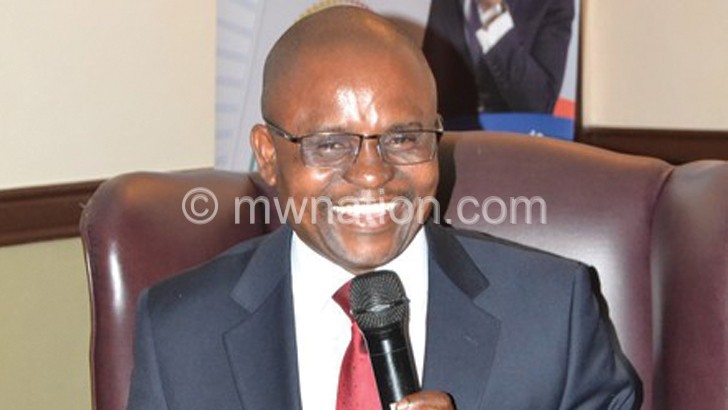Bank fees VAT debate rages
Debate on the introduction of 16.5 percent value-added tax (VAT) on some banking services continues with a tax expert and Malawi Revenue Authority (MRA)
differing on how the tax should be executed.
In his virtual presentation during a seminar organised by the Institute of Chartered Accountants in Malawi (Icam) on the introduction of VAT on some banking services, taxation consultant Misheck Msiska said VAT is a consumption tax, meaning that it is the consumer who bears the burden and not the service provider.
But on his part, MRA deputy commissioner general Henry Ngutwa, who was also a panellist during the seminar, maintained that the amendment to the VAT Act did not introduce any new VAT and, thus, banks were not supposed to pass it on to consumers.

Msiska, who is MM Tax Advisory Services managing director, said the VAT on some banking services will boost government’s revenue, but at the expense of consumers of banking services who will shoulder the burden.
He said the nature of the tax justifies banks decisions to extend it to customers.
Msiska said: “Banks will levy the VAT on top of their normal fees, commissions or charges and both will be paid by the customer, thereby increasing the price of the concerned services.
“We are actually not surprised that is what will happen and is happening because it is inevitable. Consumers will pay more and in the end there will be less demand for banking services.”
While observing that the amendment is clear in terms of services that should be subject to VAT, he pointed out that the amendment would also implicate mobile banking services and, therefore, hinder financial inclusion.
Msiska said: “The cost of transferring money and transacting on mobile banking will increase and this has more consequences than conventional banking because the poor transact on mobile platforms and will increase on the services.”
In his contribution, Ngutwa said what the amendment did was to clarify that banks cannot just bundle all their services and treat them as one.
He said: “The only exception that is applicable in respect of banking services relate to provision of services that speak to the taking of deposits and playing an intermediary role of a bank that is dealing with lender borrower relationship.
“The clarification that was made in the 2021 Amendment Act isolated 11 transactions which when you look at, speak to provision of services outside the core banking system.”
Ngutwa said most of those need not lead to a situation where banks should pass the burden to consumers because there are third parties involved who should bear that or banks should look at what others are doing to make VAT inclusive.
However, the quality of questions from the audience, comprising about 100 participants from diverse disciplines, exposed a wide knowledge gap on taxation and financial issues.
For instance, one of the participants sought clarification on the charges that banks are legally meant to pass onto the consumer while another wondered whether the VAT levied can be as high as K100.
During the seminar, tax consultant Emmanuel Kaluluma, a former commissioner of tax at MRA, also took his turn to quiz Ngutwa on why the amendment is changing now given that the VAT Act has been in existence since
2005 and since then services that are now VAT eligible and classified as non-banking services have been classified as banking services.
The VAT (Amendment) Act outlines the non-banking services that will attract VAT include administration fees for providing statements, payment orders or transfers and charges for the provision of online banking.
The VAT will also be applicable on credit card late payment fees or limit excess fees, charges for withdrawals from automated-teller machines, fixed or variable fees for providing bank drafts, electronic transfers and foreign currency.
Services such as safekeeping and safety deposit boxes, interchange between banks and merchant service fees or discount rate fees will also attract VAT.
Meanwhile, Bankers Association of Malawi (BAM) said individual banks will make decisions on whether to pass on the 16.5 percent VAT on non-banking services fees to customers or not.
BAM chief executive officer Lyness Nkungula said in an earlier interview that banks have different approaches and operate according to their business strategies.
She said: “The VAT is on the charges and fees that the banks get from customers. For instances if your bank charges you K300 for withdrawals, the VAT will be on the K300 and not the amount you withdraw. From here, each bank will take it as a business decision as to how they do it whether to absorb the whole amount or not.”
Nkungula added that banks being corporate citizens have to comply with any legislation that affect them, highlighting that banks are only acting in accordance with the law.
Presently, commercial banks such as FDH Bank plc, NBS Bank plc, First Capital Bank, Standard Bank plc and MyBucks Banking Corporation have already published statements announcing revised tariffs, including “free” services.
In Malawi, the majority remain unbanked as per results of a recent FinScope Malawi Survey that showed 67 percent of adults have no bank accounts. The situation is attributed to prohibitive bank charges.
Disturbed by the high numbers of people outside the formal banking system the Ministry of Finance in 2017 launched the 2016- 2020 Strategy for Financial Inclusion which provided direction towards achieving and promoting inclusive finance in the country





